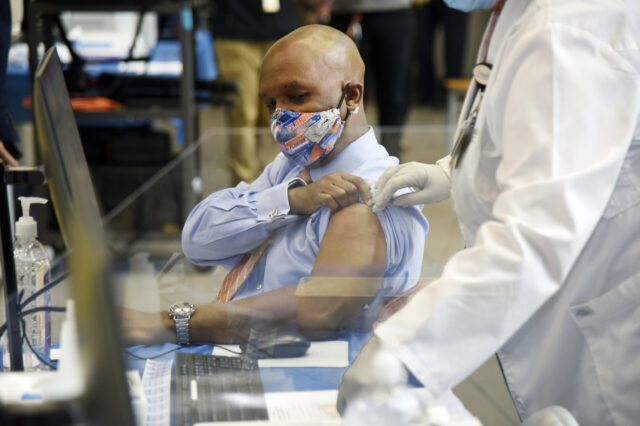UF Health Jacksonville first in Florida to administer COVID-19 vaccine

A group of 10 front-line health care workers at UF Health Jacksonville are believed to be the first in Florida, and possibly the Southeast, to receive the Pfizer-BioNTech COVID-19 vaccine Monday morning, shortly after a shipment of 20,000 doses arrived at the health system.
At 10:39 a.m., Dr. Leon L. Haley Jr., a board-certified emergency room physician, CEO of UF Health Jacksonville and dean of the University of Florida College of Medicine – Jacksonville, is thought to be the first in the state to be vaccinated. He was followed by additional physicians, nurses, a pharmacist and other health care workers who work in areas of the hospital that most frequently care for patients with COVID-19.
“This is a humbling moment,” Haley said. “I’d like to extend my deep appreciation on behalf of all of our front-line caregivers, here and around the world, for their resilience and heroism. This is an important step today in our battle to end this pandemic, and as one of the nation’s premier health systems, we will follow CDC guidance and do all we can to help lead the effort to cascade the vaccine out to other priority groups in the community and around the state as more doses become available in the coming weeks and months, particularly to underserved populations and those who are most vulnerable.”
UF Health Jacksonville has been designated one of the “Pfizer Five” — a handful of sites in Florida selected to receive the initial distribution. UF Health officials are actively working with local, state and federal agencies, and anticipate beginning to administer the vaccine for free to additional groups of select faculty and staff based on the criteria the Centers for Disease Control and Prevention has established. They will start with front-line health care workers and staff deemed high priority because they are caring for COVID-19 patients and/or working in areas like the emergency room where they are most likely to encounter an exposure.
UF Health Jacksonville also is working with the Florida Department of Health to coordinate distribution to other hospitals and health care providers in Jacksonville, along with UF Health’s health campuses in Gainesville and Central Florida, although the timing is still being worked out. Simultaneously, state officials are designating some shipments to long-term care facilities, whose residents are among those at highest risk for serious or even deadly complications of COVID-19.
Additional shipments will be sent to the state every one to two weeks. It is anticipated that at first there will be a limited supply.
The vaccine is not mandatory: UF Health faculty and staff will be able to choose whether they receive it, although participation is strongly encouraged.
“Even amid our excitement, we are mindful that for some in our country and around the world, this news comes too late,” said Dr. David R. Nelson, senior vice president for health affairs at UF and president of UF Health. “Many have friends or families who have been directly impacted by COVID-19. Our hearts go out to them. And that’s why we must not let down our guard. Please continue to wear a mask, practice physical distancing and frequent handwashing, and avoid large social gatherings. With a bit more patience, we will get to that light at the end of the proverbial tunnel as safely as possible.”
Most of the COVID-19 vaccines under development require two doses, with the second dose given 17–21 days after the first one. Although some degree of immunity might be provided with the first dose, the studies examining how those vaccines worked used two doses. The Pfizer-BioNTech vaccine requires two doses 21 days apart.
UF Health experts say they are confident in the research that has shown the vaccine to be safe and effective.
“The fact that we have a vaccine to administer less than a year after the start of the pandemic is astonishing, but reassuring,” Nelson said. “That’s because shortcuts were never taken when it comes to the science. When we say we trust the vaccine, what we mean is we are trusting the data behind the vaccine. And we trust that it will help save countless lives. It’s not enough to diagnose and treat COVID-19. We must prevent it as well.”
Media contact: Dan Leveton at Daniel.Leveton@jax.ufl.edu or 904-537-5481.